Opinion
MAERSK, NGELALE AND NEEDLESS DIATRIBES
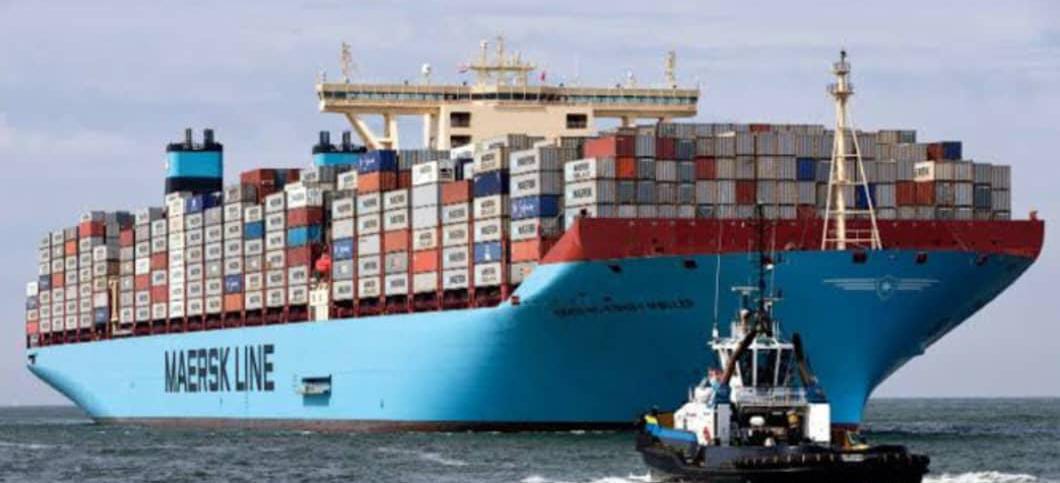
BY BOLAJI AFOLABI
For democracy to thrive, it is imperative that various elements including opposition political parties, civil societies, faith and community-based organisations, the media, and citizens play their respective roles as watchdog of government in every way, where possible. Since Nigeria’s return to full-blown democracy in 1999, the fourth republic has witnessed the emergence and relevance of some individuals and groups who, at different times and diverse ways performed defining functions as checks to successive governments. The likes of Olisa Agbakoba, SAN; Ayo Obe; Late Yinka Odumakin; Idiat Hassan; Ene Obi; Auwalu Rafsijani; Hussein Abdu; Clement Nwankwo; Kayode Ogundamisi; Jite Ogunye; SISLAC; SERAP; CDD; PLAC; PLAN; Action Aid; Save Nigeria Group as recognized and legitimate groups and activists have succeeded in monitoring different governments. As properly constituted entities whose primary agenda is national development, they have remained largely focused by giving knocks, offering back-pats, and proffering perspectives to governments where and when necessary.
In the past few years there has been a preponderance of self-styled CSOs whose objectives and modus operandi are patently pecuniary-driven and attention-seeking. A situation like this calls to question the integrity and morality of “public policing” in democratic development. It is tragic that in most cases, these latter-day organisations are largely procured to “fight a cause” and do the bidding of certain pay masters without recourse to objectivity, sincerity of purpose and national interest. Sadly, these incongruous and derisive groups which are usually managed by one-man or few persons are by their narrow mindedness and selfish desires doing collosal damage to national growth and development. Careful analysis of the activities of CSOs during military governments, and the early years of the fourth republic when juxtaposed with what is presently obtainable reveals glaring decline. In terms of effectiveness and efficiency, these “new age” groups are shamelessly rubbishing the noble ideals of CSOs as enunciated by its progenitors such as Late Gani Fawehinmi; Late Chima Ubani; Late Beko Ransome-Kuti; Late Bala Usman and others.
Unknown to many Nigerians, in the past few days, there has been a coordinated effort by some faceless individuals and phoney CSOs to skew narratives about the injection of $600m into Nigeria’s economy by A.P. Moller-Maersk, a global maritime and shipping conglomerate. The vicious and contrived controversy generated, is patently unpatriotic, outrightly devilish, and ludicrously juvenile. Attempts to poo-pooh and demonise certain government officials notably Ajuri Ngelale, the presidential media adviser, and throw invectives at the audacious moves by the Tinubu administration in negotiating and sourcing foreign direct investment is totally uncalled for.
I have never met Ngelale. He was a familiar face on television before his current brief in the Tinubu scheme. I speak in this instance as a politically unaffiliated journalist and a dispassionate Nigerian. To rehash the catchphrase of former President Muhammadu Buhari in his early days, “I belong to no political party, but I belong to every well-intentioned plan to get Nigeria working.” One of the “fast food, pasta-like” CSOs procured for this insipid project has deployed vacuous tactics in its stain and spoil statement, calling for the disengagement of some government officials. The plot has clearly exposed the intentions of these purveyors of falsehood, deceit and confusion. Having had years of close interaction with activists, research, investigation, and less sensationalism should ordinarily be germane to the principles and operations of CSOs. Unfortunately, these attributes have been jettisoned by the groups and individuals involved in this anti-Ngelale plot. Their approach has been at best mischievous preposterous, insensitive, and insourciant to national interest.
In their respective bids to present skewed and rancorous agglomeration of variegated misinformation with mischievous intents, they forgot to uphold the time-tested and serially-proven operational guidelines anchored on fairness, firmness, and objectivity. They seem to have chosen the route of deliberate falsehood, targeted browbeating, and pillorying innuendos to whip up public sentiment against government. They have most probably recoursed to wrongful vilification and demagoguery of government officials to elicit a bandwagon effect among unsuspecting Nigerians. This may be a reflection of competency deficit, conceived shenanigans and intellectual indolence. After detailed and dispassionate reviews, assessment and distillation of the narratives and explanations by government and it’s accusers, one can conclude that the “CSOs and individuals” are guilty of one or more of these conjectures.
From reports in the local and foreign media, President Bola Tinubu and Mr. Robert Maersk Uggla, Chairman of A.P. Moller-Maersk, a Danish global provider of logistics and services in the maritime industry had a meeting on the sidelines of the recently concluded World Economic Forum in Riyadh, Saudi Arabia. According to the presidency, at the end of deliberations, Maersk, whose company has been operating in Nigeria’s shipping and maritime sector for over three decades reiterated it’s commitment to on-going investment drive by government towards deepening growth and development. Maersk further re-affirmed the company’s resolve to expand its investment in the Nigeria’s shipping industry which is expected to be mutually beneficial. However, in a bogus campaign to downplay this laudable development, some CSOs, social media influencers, and opinion moulders copiously refered to a “rebuttal” published in Lloyd List, one of the World’s oldest-running maritime journals. In the report, an unnamed person among other things denied knowledge of such extensive talk between Maersk and Nigeria; that the investment plans appears to be news to it’s officials.
Further extrapolation of the news report bandied by naysayers reveals yawning gaps and holes. That the celebrated online maritime publication quoted an unnamed and non-descriptive Maersk official casts doubt about the veracity of the report being circulated by mischievous elements. The report, contrary to the warped interpretation of critics emphasized that, “discussions (between Maersk and the Nigerian government) were on-going.” Reasons that the entire Maersk team was yet to get full disclosure was equally provided in the news report by the unnamed official, “….. may be by next week, we would be properly briefed.” It should be noted that at the time naysayers activated their spin arsenals, Maersk was yet to deny or contradict government’s position as released by Tinubu’s spokesman. Why “pick and choose” by these critics? Why not dwell on the entire news report and do proper inquisition if any? Why the unnecessary dust and hullabaloo? Why the wrong, pervasive vilification of Tinubu’s spokesman?
Findings from further research and empirical studies reveals that in February 2024 in the course of an exploratory visit to Nigeria’s Minister of Industry, Trade and Investment, Dr. Doris Uzoka-Anite, the A P. Maersk Terminal Chief Executive Officer, Keith Svendsen detailed the company’s $600m investment commitment to Nigeria’s economy. Svendsen, who re-affirmed Maersk’s commitment to investing more in Nigeria, clearly outlined plans to allocate “an initial $100m, with an additional half-billion dollars ($500m) earmarked for port investments in Lagos, Nigeria.” Contrary to wrong insinuations, the Riyadh meeting was another opportunity by Maersk to re-confirm it’s investment interest in Nigeria’s maritime sector. These investments are expected to support modernisation and expansion of our ports; improve trade; reduce corruption; and boost efficiency. Maersk’s interest in the sector is buoyed by government’s commitment, and to complement on-going $1bn development of seaports construction and development across Nigeria’s eastern and western ports.
In a widely published statement by Maersk that did not only expose the despicable, hideous, and vengeful intentions of traducers but explicitly described the seriousness and benefits of the company’s investment in Nigeria, Svendsen confirmed that the company has concluded plans to invest over $500m in the upgrades of Nigeria’s port facilities. He added that, “I earlier this year publicly told about the proposal to invest more than $500m that we have discussed with President Tinubu both in February, and which we further elaborated in late April. We have intensified talks with the administration and port authority to make these plans concrete and I’m pleased with the significant progress made towards implementation.” According to Svendsen, the global logistics and provider has being a critical stakeholder in Nigeria’s maritime sector with, “container terminals in Lagos, Apapa, and Onne, provision of high-quality and modern equipment, direct employment of about 2,500 people, and indirect employment of about 65,000 people.” Maersk in the words of Svendsen, “believes strongly in the future prospects for the Nigeria economy, and the long-term opportunities that the current economic reforms and invitation for international investments will generate.”
Contrary to the negative narratives floating around, Maersk, while acknowledging Nigeria as the key market in Africa, and the company’s central role in trade between Nigeria and the rest of the world, is determined to consolidate it’s position as a leading force in Nigeria’s maritime sector, and desirous to upgrading it’s greenfield terminals in Lekki and Badagry as well as other ports infrastructure across the country. Svendsen declared that, “we seek to do this under a long-term agreement with the government to support our ambition to continuously improve the import and especially export opportunities for the country, creating jobs and diversifying opportunities locally. For us, it is important that we not only operate highly efficient terminals, but also that we play a role contributing to the development of the local communities and bring opportunities for growth and new prospects in Nigeria.”
For emphasis, Nigeria and Denmark have always had a robust, and mutually beneficial business relationship spanning four decades. This relationship has involved steady exchanges of goods and services, crude petroleum, concentrated milk, non-fillet frozen fish, margarine, transportation, solar power, renewable energy, biotechnology and few others. Specifically, Maersk with over $2b existing investments in Nigerian ports and other activities has shown that it’s involvement is not just fruitful but transcends to reputable and equitable partnership with states including Ogun where a container terminal is under construction.
Finally, rather than resort to cheap, mindless, and fruitless public ridicule as well as unnecessary debilitating politicisation of any, every intention and programme of government that will impact positively on the country and citizens, it is incumbent on “professional naysayers” to allow objectivity to prevail. In matters of development, banal reasoning, ethnic consideration, and tribal imputation should be subsumed under national interest and true nationhood. Multi-faceted buffeting, multi-pronged chicanery, and caustic denunciation of appointees and officials of government by hirelings and sourced ranconteurs is not what Nigeria need now. Given the multi-dimensional economic challenges and corrosive poverty that Nigerians are experiencing, every human capacities should be deployed towards supporting any development-driven initiative by government. The comments of Maersk’s Chairman at the Riyadh meeting with Tinubu will suffice, “with the growth potentials of the Nigerian economy, we are very eager to invest in it, and we will continue to dialogue with the relevant Nigerian authorities to explore further investment opportunities in an economy that has the capacity and potentials to be among the best in the world.”
*Bolaji Afolabi a seasoned media practitioner, has served in the Office of Public Affairs in The Presidency and as Communications Resource Person in the House of Representatives, respectively.*
Opinion
5G,IoT and AI to boost global GDP by 2030

By Sonny Aragba-Akpore
With Mobile technologies and services now generating around 5.8% of global Gross Domestic Product (GDP) a contribution that amounts to about $6.5 trillion of economic value, there are strong projections that by 2030, this figure will rise to almost $11 trillion, or 8.4% of GDP.
Global System of Mobile Communications Association (GSMA) says much of this will be driven by countries around the world increasingly benefiting from the improvements in productivity and efficiency brought about by the increased take-up of mobile services and digital technologies, including 5G, Internet of Things (IoT) and Artificial Intelligence (AI).
The GSMA recently introduced the 5G Connectivity Index to provide insights into 5G performance in 39 markets in order to encourage informed decision-making.
In terms of Economic Impact,
the GSMA emphasizes the economic benefits of mobile technologies and services, including 5G, projecting that they will contribute significantly to GDP growth by 2030.
“The GSMA provides specific reports and analyses on 5G in different regions, such as Sub-Saharan Africa, Asia ,Middle East among others highlighting the progress and challenges of 5G deployment in specific areas.”
In Sub Saharan Africa for instance with particular attention on Nigeria,South Africa,Egypt,Kenya and Botswana among others some measure of progress in deployment has been recorded.
The rollout of 5G has brought immense benefits across multiple industry sectors, particularly those involving internet of things (IoT) and artificial intelligence (AI) applications in which the real-time transfer of data is crucial.
More broadly, the adoption of 5G is expected to accompany increased data use across the globe, with forecasts anticipating mobile data traffic of over 300 exabytes per month by 2030, more than twice the volume consumed in 2024 according to Statista.
And with a third of global population expected to be covered by this fifth generation (5G) networks ,a technology that has defined new ways of communication by 2025 ,GSMA
says the technology has surpassed growth projections of all times.
“5G subscriptions increased by 163 million during the third quarter 2024 to total 2.1 billion. 5G subscriptions reached close to 2.3 billion by the end of 2024 accounting for more than 25 percent of all global mobile subscriptions.
“4G subscriptions continue to decline as subscribers migrate to 5G” according to GSMA.
As of the first quarter of 2024, there were nearly two billion 5G connections worldwide, with 185 million new additions. This is expected to grow to 7.7 billion by 2028.”
Statistics show that 5G is the fastest-growing mobile broadband technology, reaching 1.5 billion connections by the end of 2023.
It only took four years to reach this number, compared to 10 years for 3G and more than five years for 4G.
“5G is more than a new generation of technologies; it denotes a new era in which connectivity will become increasingly fluid and flexible.5G Networks will adapt to applications and performance will be tailored precisely to the needs of the user” GSMA submits.
By covering one-third of the world’s population , impact on the mobile industry and its customers will be profound according to GSMA.
To deepen the spread of 5G ,GSMA is working closely with the mobile operators pioneering 5G, “by engaging with governments, vertical industries including automotive, financial services, healthcare providers, transport operators, utilities and other industry sectors to develop business cases for 5G.”
And In order to accelerate the growth and spread, many operators are said to be deploying
AI technology as part of an integral part of telecoms operators’ strategic and operational plans.
“Operators are making important advancements in the deployment of AI technology, which is serving as a transformative force shaping the telecoms industry. By deploying autonomous AI-based systems, operators can enhance operational efficiency, customer satisfaction and security, while also creating new revenue opportunities”.
China, South Korea, the United Kingdom, Germany, and the United States are the leading countries with robust 5G coverage in the world.
Since the first commercial launches of the fifth generation of mobile networks in late 2018, these five countries have emerged as leaders because multiple companies in these countries have deployed networks and are selling compatible devices. Countries including Switzerland and Finland are up and comers in 5G development, though they have limited deployment.
In China there are three Companies leading in deployment.
The world’s largest 5G network was launched by the three largest Chinese network operators Oct 31, 2019, according to the state-run news agency Xinhua. These are China Mobile, China Unicom, and China Telecom which all activated their networks in less than five months after they were issued 5G licenses.
Each of the network operators offered their 5G services at $18 per month in 50 Chinese cities at the beginning of the launch.
GSMA expects 36% of China’s mobile users to be using 5G by 2025. That’s about 600 million subscribers, who would also make up 40% of the entire global 5G market by this year.
This is all despite efforts made by the United States government to hamper the progress of Chinese vendors, though those efforts may affect how Chinese companies may expand into the global market.
In South Korea,SK Telecom and Korea Telecom run as the main competitors for the South Korean 5G market.
SK Telecom acquired spectrum in the 3.5 GHz and 28 GHz frequencies to prepare for deploying 5G.
In April of 2019, the Enterprise claimed to be the first mobile carrier in the world to launch 5G services to work on 5G smartphones. SK Telecom asserted an edge over rival Verizon, as the former launched 5G services available at the same time as Samsung Galaxy S10 5G smartphone launched in South Korea. Verizon launched mobile 5G services in the U.S. before a 5G enabled smartphone was available to U.S. consumers.
SK Telecom also conducted tests with a 5G Standalone (SA) Core (a core not reliant on the 4G network) for their 5G network in cooperation with Samsung Electronics.
The world’s largest 5G network was launched by the three largest Chinese network operators Oct 31, 2019, according to the state-run news agency Xinhua. These are China Mobile, China Unicom, and China Telecom which all activated their networks in less than five months after they were issued 5G licenses. Each of the network operators offered their 5G services at $18 per month in 50 Chinese cities at the beginning of the launch.
“What we are seeing is a concerted effort by the Chinese — the operators, vendors, and government regulators — to deploy 5G as quickly as possible,” Chris Nicoll, principal analyst at ACG Research, pointed this out in a November 1, 2019 SDxCentral article.
With all of these players working together, the three network operators had collectively deployed nearly 86,000 5G base stations peaked over 130,000 by the end of 2019. The latter number breaks down into China Unicom and China telecom, with each planning to install 40,000 base stations, and the market leader China Mobile to install 50,000.This was the projection by 2019 but they have since overshot this by the beginning of 2024.
The International Telecommunication Union (ITU), says 5G coverage reached 40% of the world’s population in 2023 with an uneven coverage and distribution with developed countries having more coverage than low-income countries:
In Europe ,68% of the population is covered and
Americas had 59% of the population covered while
Asia-Pacific has 42% of the population covered as at 2023.
Arab States have 12% of the population covered.
Commonwealth Independent of States (CIS) had 8% of the population covered.
ITU figures show Africa,s coverage rose to 10 % of the population by 2023 .
The ITU also notes that 90% of the world’s population is covered by 4G, but 55% of people without access to 4G live in low-income countries because In low-income countries, 3G is often the only technology available to connect to the Internet.
The ITU develops and adopts international regulations and global standards to enable the harmonization and implementation of broadband mobile networks.
In Africa, around a dozen nations have launched services including Botswana, Kenya, Mauritius, Madagascar, Nigeria, Seychelles, South Africa, Tanzania, Togo, Zimbabwe, and Zambia but Africa is a patchwork of 54 countries.
And penetration is predicted to be slow.
By 2027, Ericsson predicts that 80 percent of phone users in Europe will have 5G service.
At the same time, 5G subscriptions in Africa, home to 1.4 billion people, May stagnate at a little over 10 percent. Why will so few people in Africa get access to 5G services?
China, South Korea, the United Kingdom, Germany, and the United States remain the leading countries with robust 5G coverage in the world.
While many countries are already providing robust services,Africa remains on the outskirts of 5G services.
The countries in Africa that have launched 5G networks, include South Africa with its roll out
In March 2022, when the Independent Communications Authority of South Africa (ICASA) sold spectrum across several bands.
In Nigeria,MTN rolled out commercial 5G services in Lagos in 2022, with other roll out in Abuja, Port Harcourt, Ibadan, Kano, Owerri, and Maiduguri among others.
MTN Congo announced that it was the first country in Central Africa to deploy 5G.
In Botswana Orange deployed 5G technology to provide new services in the Gaborone and Francistown regions.
Other countries in Africa that have launched 5G Fixed Wireless Access (FWA) services include: Angola, Kenya, Zambia, and Zimbabwe.
Analysts say “5G’s potential is growing due to its ability to deliver fiber-like speeds. However, there are still challenges in the region, such as:
Urban areas are reaching their maximum capacity whereas a large portion of the population lives in rural areas.
This explains why 5G adoption in the sub-Saharan region is currently below six percent “
Analysts report that 5G deployment in Africa faces many challenges, including Spectrum assignment,regulatory issues,infrastructure,security,financial resources among others.
“Spectrum is a limited resource that is already in use by other services, such as TV broadcasters and satellite operators. Governments need to open up frequencies and grant 5G licenses at reasonable prices. “
Infrastructure is another major challenge.
“5G networks require a large initial investment, including expensive devices, antennas, and Radio Access Network (RAN) hardware. The infrastructure needs to be fiberized to support 5G services.
Regulatory conditions also serve as challenges to deployment.
For instance “regulatory authorities may not have started the process for licensing and granting frequencies in the right portion “
“Most of the equipment and devices required for 5G deployment need to be imported.”
There are also security challenges that make
5G technology vulnerable to cyber security threats, such as tracking calls and exposing user locations.
Opinion
Right of Reply: THE PUNCH AND BUSYBODY BUSINESS

The recent declaration of a State of Emergency in Rivers State has triggered diverse commentaries from a wide range of Nigerians.
Almost everyone hailed the presidential proclamation because of the visible threat to law and order in the state at the time the action was taken. Of course, there were a few naysayers who read political meanings into an otherwise sincere and prompt intervention.
One such negative interpretation is the position taken by the Editorial Board of The Punch newspaper. In one of its editorials published on the matter, the national daily claimed that the entire crisis was caused by what it described as “the needless meddlesomeness in the governance of the state by its former governor and Tinubu’s Federal Capital Territory Minister, Nyesom Wike….” It is unfortunate that this narrative and others like it have become commonplace in the media space.
How did the Editorial Board of a reputable newspaper arrive at such a conclusion? Their claim that the Sole Administrator, Admiral Ibok Ete Ibas (rtd), has been acting a script purportedly written by the Minister of the Federal Capital Territory, Nyesom Wike, is also faulty and has no iota of truth.
They also faulted the sacking of all political appointees who served in Governor Siminalayi Fubara’s administration, insinuating that their replacements were drawn from Wike’s political camp. Again, nothing can be further from the truth.
Since his appointment as the Sole Administrator of Rivers State, Admiral Ibok Ete Ibas has been running the state with the abundant human resources available in the state and has not imported anybody from outside the state. Did the Editors of The Punch really expect him to run the administration with the politicians loyal to the suspended governor?
Do they not know that the crop of political appointees who served Fubara would have found it difficult to work with the Sole Administrator?
Certainly, they know the truth, but they have chosen to stoke the fire to generate more tensions in Rivers State.
Certain interests might have commissioned this editorial to cast aspersions on the Sole Administrator and raise doubts about his capacity to run the state.
It may also have been the handiwork of Wike’s political detractors, the man whom many politicians love to hate for no other reason than envy and jealousy.
We urge the Punch newspapers to seek a better mode of intervention in the political situation and not dwell on innuendos and unsubstantiated allegations against certain political actors in order to blackmail them.
Dr Ike Odogwu
Opinion
“Chief. Dr. Ekuogbe Akpodiete; A Philanthropist, Lawyer, and Statesman”
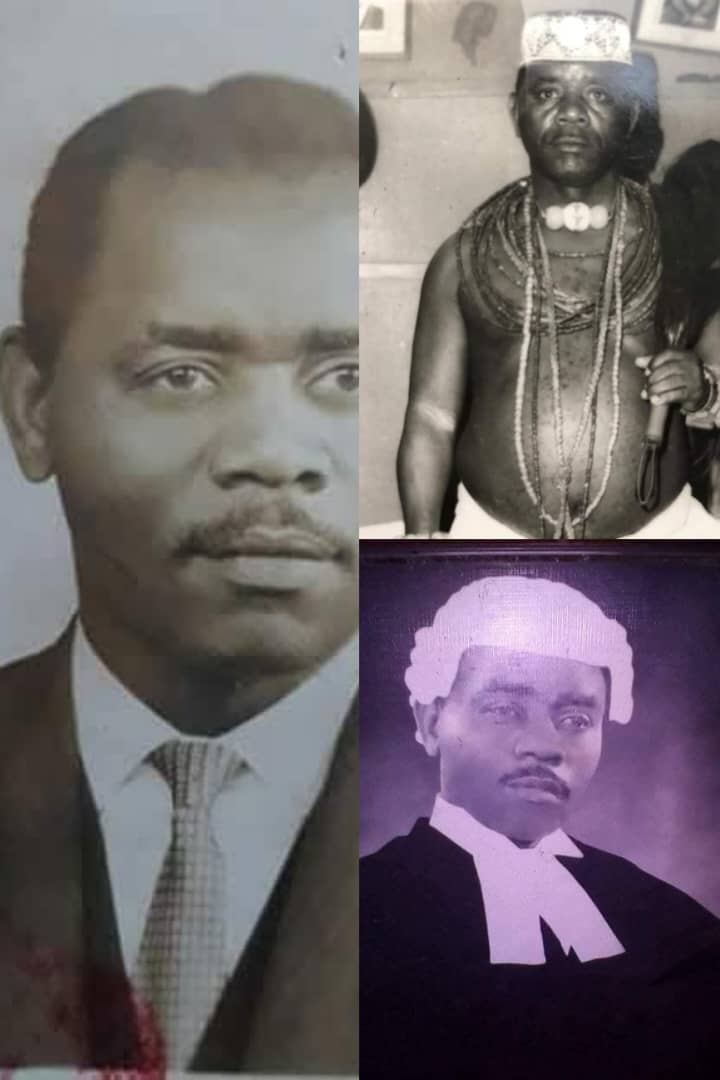
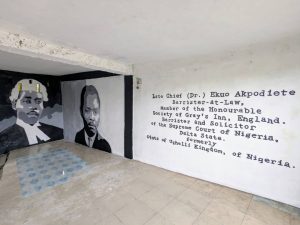
In a life of achievement, Chief Ekuogbe Akpodiete popularly called the Duke by his contemporaries in the UK was an assessment clerk, post office clerk, a court interpreter, an educationist, a business man, a political party chieftain, a Barrister and Solicitor, a Magistrate, the Otota (the Prime Minister) of Ughelli kingdom which is the highest traditional chieftaincy office that underpin the royal office of the Ovie of Ughelli Kingdom.
He was a trail blazer, a strict disciplinarian, a lover of people, and a philantropist. He saw to it that people lived in peace and happiness.
Born on the 4th of April, 1924, to parents cut from an industrious mould, Chief Ekuogbe Rowland Gregory Akpodiete took zealously to education that neither his mother Ughweriaka who was a trader, nor his father Akpodiete who was a farmer had.
He attended the Native Authority Primary School, Ughelli, and Enitona High School, Port Harcourt, for his secondary school education.
He thereafter had a brief teaching career in primary schools in Ofuoma near Ughelli, he worked as a process clerk in the then Sapele Township Department between 1950 and 1953, serving at the same time as an interpreter in the local courts.
He proceeded to the United Kingdom to seek the proverbial Golden Fleece where he worked and paid his way through, studying Law. He was admitted into the Honourable society of Gray’s Inn, England, in 1965, and shortly after, he returned home to Nigeria and attended the Nigerian Law School. He was called to the Nigerian Bar in 1966. He immediately started practice in Lagos. However, his practice in Lagos was regrettably abridged by the Nigerian Civil War, which drove him to his hometown Ughelli in 1967, where he continued to practise among his kith and kin as the first Legal Practitioner.
Chief Ekuogbe Akpodiete established himself in Ughelli. After the civil war, he served in the now defunct Mid-western State Judiciary from 1972 to 1975 as a Magistrate.
He was conferred with the chieftaincy title of Urhukperovie of Ughelli kingdom (the light of the King) by the then reigning Ovie of Ughelli, His Royal Highness Oharisi II of blessed memory in 1977.
In the quest for more knowledge, he went back to England for his Master’s degree in law (LL.M) and later a Ph.D. at the University of Warwick.
He was awarded an honourary doctorate degree (Ph.D) by Tenesse Christian University from the United States of America in 1991.
He became the Otota (the Prime Minister) of Ughelli Kingdom in 1986, an office he occupied until his demise on 9th April 1995.
Chief Ekuogbe Akpodiete was also politically involved. In the heady days of the Awolowo-led Unity Party of Nigeria, he was the party’s legal adviser in Ughelli and was on hand to assist during Chief Obafemi Awolowo’s campaign hosting in Ughelli and its environs.
In view of his love for people and entertainment, he established a popular cinema house, one of the first in Ughelli, known as REGA cinema, coined from his names, alongside an entertainment place called Unutakunu (people talk to people).
Chief Ekuogbe Akpodiete was blessed with wives and many children, grandchildren, and great grand children.
Mr. Olotu Akpodiete, PhD
Executive Director
Olotu & Ekuogbe Rowland Akpodiete foundation
-
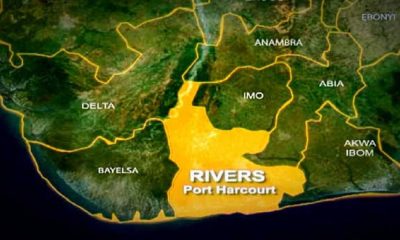
 News24 hours ago
News24 hours agoEmergency Rule: Punch Editorial went overboard – CRP
-
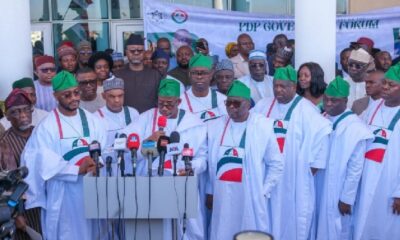
 News12 hours ago
News12 hours agoPDP governors declare support for Tinubu
-

 News15 hours ago
News15 hours agoEx-finance minister rearrested in new fraud probe
-
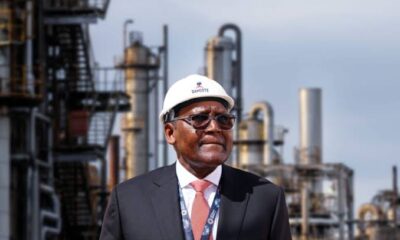
 News13 hours ago
News13 hours agoHope for Nigerians as Dangote refinery slashes petrol price again
-

 News23 hours ago
News23 hours agoJust in: Rivers Administrator summons, suspended Gov, deputy
-

 News23 hours ago
News23 hours agoCBEX Staff Arrested After Trading Platform Collapse
-
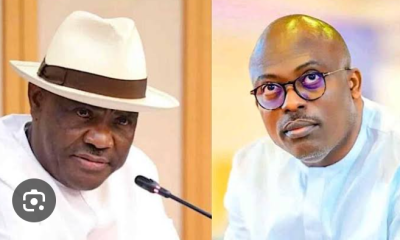
 News15 hours ago
News15 hours agoFubara: How can I forgive somebody who never requested for it– Wike
-

 News16 hours ago
News16 hours agoAlleged Se3ual Harassment: Natasha Declines Out-Of-Court Settlement Proposal By Akpabio’s Counsel






